Blues Reviews
Dec 2016/Jan 2017
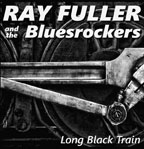 Ray
Fuller and the Bluesrockers
Ray
Fuller and the Bluesrockers
Long Black Train
Azuretone Records
Ray Fuller is a fine guitarist/vocalist. No big deal. There are a lot
of guitarists/singers. Some better than others. Fuller is in the impressive
category. He traces his professional career back long enough to have opened
for Muddy Waters and his slide guitar work apparently was such even then
that it garnered compliments from the master. There are players who use
the slide to cover up a lack of imagination. Not so with Mr. Fuller. This
is a master player who holds nothing back, including volume. You’ve
heard players who cover that same lack of imagination with volume. Again,
not so for Fuller. This is who he is - a superb slide player who uses
volume to his advantage. With his equally impressive band – bassist
Myke Rock, drummer Darrell Jumper, and harmonica player Doc Malone –
the energy could propel a long black train. There are 14 tunes to recommend
Fuller and the fellas on this, their fourth album.
The opener, Burn Me Up, sets the tone. It’s a fiery number with
a Johnny Winter kind of octane. On Devil’s Den, Fuller’s lyric
prowess shines. He sings, “The wind it was a-howlin’/…..
sounds that could bring a grown man right down to his knees/Spanish moss
was swaying/like a scarecrow in the breeze…” That’s
some stark and scary imagery! The band brings almost an updated, albeit
quite different, CCR sound to life. The following tune, naturally, is
Voodoo Mama. Not as voodoo-y as Devil’s Den, it features a driving
guitar over the lyric, “Voodoo Mama/you sure cast a spell on me.”
Hip Shakin’ Mama is a slide guitar tour de force with vocals that
remind of Alvin Lee. Let’s Get Dirty (“funky and lowdown”)
features Malone’s harp and sounds like a sideways Scratch My Back.
Whiskey Drinkin’ Woman (“stay drank most all the time”)
is that same old story. You’ve Got the Blues could have been a long
lost Chuck Berry tune. “The boss man called/you done lost your job/come
home early found your house been robbed.” The lyrics are a hundred
miles per hour and the band rocks tight.
This gets more impressive with each listen. These are no imposters. The
Bluesrockers live up to their name and flat out knock me out. Highly recommended
for blues rockers.—Mark E. Gallo
 Liz
Pennock & Dr. Blues
Liz
Pennock & Dr. Blues
Quirky Boogie
www.LizPennock.com
Liz Pennock & Dr. Blues may truly be defined by the title of their
newest release “Quirky Boogie,” Liz the world’s only
award winning six fingered piano player and Dr. Blues aka Paul Shambarger,
yes he really is a Doctor. They’ve been a couple on and off stage
for thirty-three years, Liz provides a big full sound on the 88’s
with a heavy left hand and full melodic run on the right plus harmonica,
trombone and a mature voice while Doc fills out a full band sound with
rhythm and lead guitar and his share of vocals; you don’t notice
the need for any other players in this group. On their first release in
eight years Liz and Doc take an equal share in the songwriting with the
other third some tasty covers.
Liz’s songs begin with the bouncing title tune “Quirky Boogie,”
she states all their friends have their quirks but they love them because
they’re quirky too and with an affectionate play on words tells
of her two biggest delights, her “Grand Baby Grand.” Going
solo for the instrumental “Boogie Woogie For Mr. Sabino” Liz
pays tribute to the man who taught her trombone and started her on Boogie
Woogie. With a tip of the hat to Ellington, it’s Liz’s abandonment
and Doc’s scorching guitar that portrays the joy of “Mortgage
Burning Boogie.” Liz sings of their love and unbreakable bond in
“Anniversary Song” with Doc’s guitar echoing her every
note. Shambarger takes the mic for five tunes he’s written starting
with “Paris In The Snow,” a true tale of their thirtieth anniversary
trip to France in the winter while Liz blows a mournful chill on trombone.
Doc takes a turn on piano, bass and vocals for “Angel at the Piano”
a touching song he wrote at the beginning of their relationship. A message
of faith resonates through “That’s What He Said” and
with two humorous tracks sings about the plight of “Stuttering Woman
Blues” as Liz repeats her piano on harmonica and Doc laments being
a “Low-Tech Guy” living in a high tech world. Liz takes a
moody turn on Memphis Minnie’s “Bumble Bee” with the
slide guitar buzzing in and out, then Doc takes to the mic as they rock
out on Carl Perkins’ “Matchbox.” For their friend and
fellow pianist Liz plays a rambling full-fingered intro on Ann Rabson’s
“Dr. Blues,” a song she always played for them. As a tribute
to two of Liz and Doc’s musical heroes in one song, Eric Clapton
and Leon Russell’s “Blues Power” is followed by another
duo, Jeannie and Jimmy Cheatham’s tune “Meet Me With Your
Black Drawers On.”
With over three decades making music together “Quirky Boogie,”
shows why Liz Pennock & Dr. Blues complete each other in so many ways.
—Roger & Margaret White
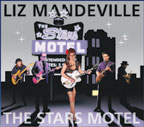 Liz
Mandeville
Liz
Mandeville
The Stars Motel
Blue Kitty
It seems like Liz Mandeville has been recording for longer than she actually
has. Maybe it’s that old soul that seems to inhabit her music. She’s
played guitar since she was 16, initially heavily inspired by John Hurt,
but then later by Lightnin’ Hopkins and, strangely, James Brown.
She’s been on tours with the likes of Honeyboy Edwards and Albert
King, and she’s an inductee into the Chicago Blues Hall of Fame.
In between whirlwind worldwide tours and recording she found time earlier
this year to be certified as a Sound Healer, working with sound as a healing
art. I’m not going to proclaim that this is music that heals, but
it sure does get you off a lazy psyche and ready to shake those limbs.
She has become a certified triple threat blues powerhouse over the years,
as well as adept at apportioning speaker time to others. The lead guitar
on the opener, Too Hot For Love, for instance, is the very hot Tulsa rocker
Scott Ellison with Liz assigned to vocals. When you sing as powerfully
and convincingly as she does, that’s just plenty. She sings, “Its
99 degrees and you’re mashing up all my clothes…it’s
too hot to eat/too hot to sleep/I feel like a wet blanket when I’m
walking down the street/too hot to push/too hot to shove/too hot to even
thinking of making love.” She sure paints a vivid picture! She plays
the second gorgeous lead on Blues Is My Boss, following Italian blues
star Dario Lombardo. The results are splendid. Her voice is elastic and
emotive. “I drink my coffee/I still got the blues.” Everybody
Knew But Me is a song that almost says what it needs to just in the title.
“My baby was havin’ a great time/they were getting down all
over town/everybody knew but me.” Mandeville plays the guitar and
the washboard, and Jim Godsey’s percussion includes a whistle, which
works well with Steve Hart’s tuba, giving it an NOLA atmosphere.
One Dance features Minoru Maruyama, a guitarist and vocalist from Japan
who has worked with Liz previously. Her delicate opening bars in conjunctions
with Joan Gand’s nuanced B3 lead to a gorgeous blues from Liz. The
guitar is extraordinary, the horns (Jeannine Tanner, trumpet; Johnny Cotton,
trombone; Charlie Kimble, sax) add the magic and the song is a trip to
60s soul. Miami’s Rachelle Coba shares guitar and vocals with Mandeville
on the sassy Try Me. Liz sings “I’m full grown/I ain’t
no child” and you know that’s a fact. She sings that she’d
“rather have fun/youth is overrated/experience counts/try me and
you’ll find out.” Truth, with Minoru Maruyama again on board,
finds our heroine worried about the interpretation of the “truth.”
She sings, “My guts tell me that I’m being played” and
“You are on my very last nerve/forgive and forget/but you’ve
thrown me a curve.” Real life. Dizzy Bolinski’s harp is a
nice touch here. . Reefer and a Glass of Wine is a song title that’ll
get some attention. Detroit-bred Doug Deming, now out of Miami, takes
a turn on swinging guitar on this timeless number. Folks have been singing
about this since at least Fats Waller’s era. Liz sings, “Whiskey’s
good/whiskey’s fine/I like reefer and a glass of wine/don’t
want no blow/don’t get me low/I want reefer and a glass of wine.”
Simple enough. The horns give it the right oomph. What Could Have Been
is Liz with Joan Gand on organ, Matt Kohl on drums and Robbie Armstrong
on a tune that reminds of Candye Kane, which is a compliment from these
quarters. The eleven songs here are a glimpse into the artistry of Liz
Mandeville. This is a whole lotta fun.—Mark E. Gallo
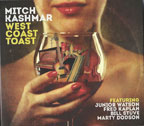 Mitch
Kashmar
Mitch
Kashmar
West Coast Toast
Delta Groove 2016
Multi-talented singer, songwriter, and harmonica ace Mitch Kashmar roars
back to the recording arena with his first release in six years, and it’s
a good one. The native of Santa Barbara was leader of the renowned Pontiax
of the 1980s and 1990s, and has continued his career in his adopted home
of Portland, OR, with a number of lauded albums on the Delta Groove label
and a busy touring and festival schedule.
On this outing, Kashmar and producer Jeff Scott Fleenor call on the talents
of some of the left coast’s finest musicians. Holding down the six-string
seat is Junior Watson, erstwhile guitarist of Rod Piazza and the Mighty
Flyers and with innumerable credits to his resume. Another Piazza alumnus,
Bill Stuve, plucks the bass strings, and former Mark Hummel bandmember
and frequently tapped session man Marty Dodson flicks the drumsticks.
Rounding out the ensemble is top-notch keyboard man Fred Kaplan, of the
Hollywood Fats Band and Hollywood Blue Flames, who tickles the ivories,
pulls out the organ stops, and on one number plays the cabasa.
What is a cabasa? My dictionary has no entry for “cabasa,”
but by email Mr. Kaplan enlightened me that it is a hand-held percussion
instrument similar to the maraca. The track on which Kaplan plays the
cabasa, “Too Many Cooks,” is a well chosen Willie Dixon tune
providing room for Kashmar to display both his vocal and harmonica skills.
Several other covers also receive adept treatment, including songs by
Billy Boy Arnold, Lowell Fulson, and John Lee Williamson (Sonny Boy I).
The latter, “Alcohol Blues,” evinces Kashmar’s frequent
choice of tunes both risible and poignant.
No slouch at composition, Kashmar claims authorship of six of the eleven
tracks. Among my favorites is “The Petroleum Blues,” with
its recognition of our harmful addiction to that ubiquitous fossil fuel.
The song sports one of Mitch’s best vocals, full of verve, soul,
and range.
Singing? We don’t need no singin’ (although we like it!)!
Accordingly, four of Kashmar’s original compositions are instrumentals,
and each shines. The album begins with the uptempo “East of 82nd
Street,” followed somewhat later by “Mood Indica,” a
slow number highlighting some slippery and supple harmonica. “Makin’
Bacon” gooses up the rhythm again, and the CD ends with the tour
de force, almost eight minute long “Canoodlin’,” with
Kashmar this time wielding a chromatic harp. On each of these Watson and
Kaplan are given room to strut their stuff, expertly, while Stuve and
Dodson maintain a solid bottom and the latter intermittently adding some
surprising and pleasing flourishes.
A worthy return by one of the West Coast’s best and his compadres.—Steve
Daniels
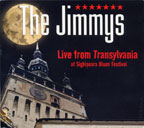 The
Jimmys
The
Jimmys
Live From Transylvania, At Sighisoara Blues Festival
Brown Cow Productions thejimmys.net
The Jimmys came roaring out of the wilds of Wisconsin with their last
studio platter “Hot Dish,” but there was a suspicion that
the studio environment might be holding this band back. While on tour
to promote that “Dish” they recorded this hot set, “Live
From Transylvania, at Sighisoara Blues Festival.” The band features
Jimmy Voegeli on keys, vocals and writing most of the tunes, Perry Weber
guitar, vocals, Mauro Magelian drums, John Wartenweiler bass, Pete Ross
sax and the new brass players Charley Wagner trumpet, Darren Sterud trombone.
So hold on to your hat for almost a full hour of a non-stop roller coaster
ride, banking on the horns, rolling on the keys, screaming guitar ripping
through at full speed, only slowing down to get to the top and ride again.
This mini big band takes the stage with their original instrumental “Jacqui
Juice” it gains momentum and hits its stride with a haunting Hammond,
swinging guitar and horns blasting red hot! Rolling right into “I
Wonder” Voegeli belts out the lyrics till Wagner’s trumpet
blasts it out of the park as Jimmy pulls it back in on vocals. They rip
into a Jerry Lee-style pounding piano for fellow Wisconsinite Jim Liban’s
tune “You Can’t Hurt Me Anymore,” the wailin’
sax is just barely in control as they draw to a close. Easing back on
the throttle they let the vocals take charge as this fool in love asks
is this “Hell Or Heaven.” Having caught their breath a pumping
piano pushes the horns aside on a Fats Domino-like romp on “Love
Will Find A Way” the trumpet maneuvers for a solo till the guitar
muscles in to take over. That guitar breaks the ice as Jimmy slides in
with this rare Mack Rice tune “Cold Women” with chilling keys,
the sax blows a cool riff while the band burns so hot the temperature
never drops till that head of stream lets out on the “Lonesome Whistle
Blues” Jimmy belts out the vocals and the trombone blows a fat full
throttle wail. Guitarist Perry Weber takes the mic on his original “You
Say You Will,” his guitar battling that bone for the lead, then
Jimmy throws off the restraints for the whirlwind of “Lose That
Woman” before they lose their mind. As an encore The Jimmys roll
out The Band’s “Ophelia” as the horns and drums take
the show out.
The Jimmys “Live From Transylvania, At Sighisoara Blues Festival”
had to be a blast both for the audience and the band. All we can say is
hit repeat and lets go again. —Roger & Margaret White
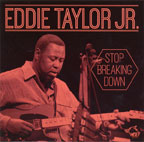 Eddie
Taylor Jr.
Eddie
Taylor Jr.
Stop Breaking Down
Wolf Records www.wolfrec.com
Eddie Taylor Jr. is a man who has reluctantly taken on a legacy. Eddie
Taylor was a sideman with Jimmy Reed, but Jr. was hoping for a career
as a hip hop DJ and rapper. After his father passed he took up his father’s
guitar teaching himself to play and steeped himself in blues. By sixteen
he joined Sam Lay & Eddie Shaw’s band and developed his own
style blending Chicago blues with a harder rock edge, while keeping each
song grounded in the blues tradition. In this German release, “Stop
Breaking Down,” recorded in 2014, Eddie Jr. leads the band on guitar
and vocals, his brother Timothy on drums, Tony Palmer, guitar, Greg McDaniel,
bass and Bob Waleco blowing harp, doing classic blues and originals.
Starting off with a laid back version of Slim Harpo’s “I’m
A King Bee” the vocals are sweet & sweaty while the harp drones
throughout as the lead cuts through, then on Jimmy Reed’s “Baby
What You Want Me To Do” Eddie elaborates on what his dad started.
The guitar rings bright and clear as Eddie’s vibrant voice chills
on B. B. King’s “Ghetto Woman” then takes a more playful
tone skipping along as Eddie lays it on the line with some serious talk
with Brook Benton’s “Kiddo.” The Elmore James classic
“The Sky Is Crying” is given a more up beat swing while Eddie’s
vocal delivery captures the tone of Buddy Guy, then a modern distorted
lead guitar slips in at the end. Rearranging two traditional numbers Eddie
keeps the tempo up with a shuffle on “I Got To Find My Baby”
as a modern distorted lead slips in and on “Low Down Dirty Shame”
the harp takes the lead before letting the guitar step in, then snatching
it back as a high powered lead blasts through for the end. For two originals
Eddie’s vocal phrasing is reminiscent of Sam Cook on “You
Gotta Pay The Price” with a restrained early lead soaring on the
second verse before pulling back for the finish and “Baby Please
Come Home,” a slow stroll Taylor keeping his vocals tight and applies
a restrained vibrato lead that shimmers. Eddie takes it home playing Robert
Johnson’s “32-20 Blues” as a straight-ahead blues. Finishing
the CD with a traditional guitar and harp set featuring Harmonica Hinds,
recorded live in Vienna 2012, they engage Tommy McClennan’s “Whiskey
Headed Woman” and the title tune, Robert Johnson’s “Stop
Breaking Down.”
Eddie Taylor Jr. is a man who’s followed his fathers lead while
setting his own path and “Stop Breaking Down” is a mix of
traditional and modern that is the blues today.—Roger & Margaret
White
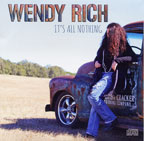 Wendy
Rich
Wendy
Rich
It’s All Nothing
Wendy World Productions www.wendyrichmusic.com
Wendy Rich, originally from Houston Texas, starting singing in rock bands
at age fourteen. This country girl relocated to the sun coast of Florida
in the early ‘90s and has been active on the blues scene hosting
jams and singing the blues. Wendy spent a few years touring with Big Brother
& the Holding Company and still occasionally makes appearances with
them. But Wendy’s got much more to offer than just recreating the
work of someone else and she’s independently produced her fifth
release “It’s All Nothing,” recorded over the past two
years in Houston, Texas, Franklin, Tennessee and Largo, Florida. Wendy
can be bold and dynamic, spicy or sweet and her songs remind me of good
whiskey - each a little different yet all tasty. Her style includes shades
of other blues women, but Rich brings her personal touch, positive energy
and plenty of enthusiasm to her blues along with a little country, rock,
and funk.
Leaping from the speakers the funky “Back To Zero” kicks things
off and Wendy’s powerful vocals rivet your attention over searing
guitar licks of Kenny Cordray and a growling pack of horns. From that
high Wendy downshifts into a sultry ballad, Paul English strokes the keys
as Tyson Sherth brushes out the beat, and Wendy’s breathy vocals
purr warm and sweet, and drawing out each emotion of her “Love And
Happiness.” With a soulful country gospel feel “Welcome Home”
hints at Tracy Nelson and it’s Wendy’s passionate vocals that
make it one of the stand out tracks. Wendy’s country roots are on
display as she gently cries through “Losin’ You” till
Cordray’s guitar rips loose but it’s Wendy’s soaring
vocals that carry it home. A bright sparking piano contrasts against a
swampy slide guitar as “Song About Nothing” gives a satirical
take on bad relationships and worse break ups. Taking charge Wendy declares
“I Just Wanna Be” your everything, with you! A Stones-like
guitar riff takes Wendy “Off The Deep End” with a weary touch
of Janis peaking over the edge as she goes tumbling down, then in closing
she pumps it up in with a “Hand Jive”-like rhythm and Wendy
is ready to “Get It Together.”
Don’t let the title “It’s All Nothing” fool ya,
Wendy Rich really is “something.”—Roger & Margaret
White
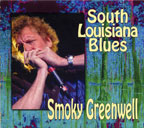 Smoky
Greenwell
Smoky
Greenwell
South Louisiana Blues
Greenwell Records
www.smokygreenwell.com
Smoky Greenwell has been a Louisiana resident for thirty- five years via
detours through Michigan, Nashville and Memphis. With “South Louisiana
Blues” Smoky delves deep into the rich sounds of his adopted state.
Greenwell is featured on harp, sax and vocals, Jack Kolb on guitar, David
Hyde bass, Joe Krown or Johnny Neel keyboards and Doug Belote, Pete Brandish
or Willie Pankar knocking out the drums on four originals and eight cool
covers.
Kicking off with a few original songs a slippery slide meanders as Smoky
declares we’re all “Animal Angels” then blows a mean
harp and sings “You Can’t Take It With You.” The harmonica
drives an almost totally instrumental jam except for the repeated chorus
of “Pick It Up” with Doug Belote on drums and Joe Krown on
B3. Greenwell pays tribute to Excello Records, Lonesome Sundown aka Cornelius
Green immersing the band into the sound of the swamp with a trio of tunes:
a rockin’ “I Had A Dream Last Night,” slowing things
down for “Lonesome Lonely Blues” with Joe Krown on piano,
then Johnny Neel plays piano and Smoky’s wailing on sax roll into
“I’m Glad She’s Mine.” Other covers include the
Wilbert Harrison classic “Let’s Work Together” which
begins slow then starts to burn as Smoky fans the flames with some hot
harmonica and the band really kicks up some dust on Bob Dylan’s
“Dirt Road Blues” and has some swampy fun with Willie Dixon’s
classic “Two Headed Woman.” The band does a few instrumentals
including “The Hunch” penned by bandmate Jack Kolb, reminiscent
of “Baby Scratch My Back” and everyone is hands-on trying
to reach that sweet spot. Breaking into “Boogie Twist” not
Snooky Pryor’s but Cal Valentine’s rockin’ instrumental,
Smoky’s on fire switching between harmonica and sax and Jack Kolb’s
guitar burns. Smoky finishes this set with Lee Allen’s ultimate
horn-driven, hand clapping sock hop instrumental, “Walking With
Mr Lee.”
Smoky Greenwell has paid his dues, found a home and poured his heart and
soul into his “South Louisiana Blues.” —Roger &
Margaret White
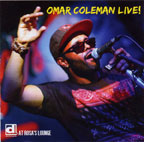 Omar
Coleman
Omar
Coleman
Live! At Rosa’s Lounge
Delmark Records www.delmark.com
Chicago’s Omar Coleman had barely put out his Delmark Records release
“Born And Raised” in the summer of 2015 when they recorded
“Live! At Rosa’s Lounge” over three nights at this blues
landmark. Coleman had been playing this gig every Tuesday with these cats
and the bond between them comes across with such a tight sound that easily
took it to another level from their recent studio CD. This band of brothers
backing Coleman’s bold vocals and harp are Pete Galanis on guitar,
Neal O’Hara on keys, Marty Binder on drums and either Dave Forte
or Ari Seder on bass and together they play blues that is true to its
roots but also includes a soulful funky groove.
This live set starts with the Junior Wells classic “Snatch It Back
and Hold It” seamlessly morphing into Johnnie Taylor’s “Wall
To Wall” and rolls confidently into Willie Dixon’s “I’m
Ready.”
Charging into a slew of originals “Born And Raised” drops
a bit of funk on the mix as Coleman and Galanis burn the sucker down with
Binder knocking out the back beat against waves of organ. With a cry of
Rock n Roll, “Slow Down Baby” barely does as a boogie piano
and hard rockin’ guitar drive Coleman’s fullt-hroated shouts.
Winding down with measured harp lines Omar rhymes his way into “Sit
Down Baby” then shuffles and glides into another Johnnie Taylor
tune “Jody’s Got Your Girl and Gone.” Slipping under
the sweet influence of “Raspberry Wine” Coleman shouts and
brags that he’s a “Lucky Man” letting his harp take
the lead with horn-like lines. For “One Request” a gentle
heartfelt ballad, Omar’s vocal delivery is mindful of Kim Wilson.
Slipping back to some funk Coleman’s harp pulls out the stops on
the Rufus Thomas groove “Give Me The Green Light” and throws
in a touch of “Mojo Working” to Willie Dixon’s “Two
Headed Woman” as the guitar heads to the country on a fast picking
fest that grinds down to a set ending finale.
Omar Coleman has his blues roots down cold and “Live! At Rosa’s
Lounge” has captured the electric energy of a live performance with
a little rock and funk in the mix to appeal to a younger generation of
blues lovers. —Roger & Margaret White
 Annika
Chambers
Annika
Chambers
Wild & Free
Under the Radar 2016
Soul and blues vocalist Annika Chambers has been a mainstay of the Houston
blues scene for several years and comported herself well at the 2014 International
Blues Challenge. Her 2015 debut release, “Making My Mark,”
was well received and benefited from the production and bass guitar skills
of Larry Fulcher and the occasional participation of his bandmates in
the renowned ensemble, the Phantom Blues Band: trumpeter Darrell Leonard
and drummer Tony Braunagel.
This sophomore CD is again produced by Fulcher and colleague Richard Cagle,
with Braunagel, and this time employs the entire Phantom Blues Band sans
horns, adding guitarist Johnny Lee Schell and keyboard maven Mike Finnigan
to the mix. Two of the dozen tunes were written by Chambers, the remainder
are covers.
Although she plays no instrument, unsurprisingly Chambers is the cynosure
of the album. Her vocal prowess is undeniable. She has powerful pipes
and a wide range, and is able effectively to evoke a gamut of emotions
from elation to frustration to sorrow. At times her efforts are reminiscent
of Aretha Franklin, Mavis Staples, and the late Sista Monica, and of fellow
contemporary Diunna Greenleaf - all intended as praiseworthy comparisons.
The set list begins with four soul-blues numbers whose power is somewhat
diminished by somewhat obtrusive drumming. “Six Nights and a Day”
rights things, Braunagel hitting a syncopated groove while Schell and
Finnigan display their long-gestated rapport. “Put the Sugar to
Bed” is a lascivious invitation to horizontal pleasure featuring
guest guitarist Josh Sklair, and “Reality” sports Chambers’
full vocal scope in front of Finnigan’s swirling organ contribution.
“Why Me” is a gospel-flavored tune in which the Phantom four
really achieve a groove. “I Prefer You” affords Chambers her
Aretha moment, aided by guests Sklair and pianist Jon Cleary, and it’s
followed by the lovely, slow ballad “Piece by Piece.” The
set ends with “Love God,” another spiritual outing in the
Staple Singers mode.—Steve Daniels
 Doug
MacLeod
Doug
MacLeod
Live in Europe
Under the Radar 2016
It’s about time that we have a live Doug MacLeod album! If you have
never seen MacLeod play live and he is appearing near you, don’t
miss him. (If you have seen him, you don’t have to be told.) Winner
of two recent Blues Music Awards as Acoustic Artist of the Year, MacLeod
has released multiple studio CDs that are uniformly excellent, but seeing
Doug live is a revelation. Whenever I go to one of his shows (as often
as possible), I know that I will leave feeling great, no matter how I
felt when I arrived. Such consistently uplifting performers are rare.
(Ruthie Foster is another who comes to mind.).
This outing was recorded in 2006 in a town in The Netherlands whose name
Doug couldn’t even pronounce...so he didn’t try. His liner
notes and banter apologize for the suboptimal state of his voice, as he
was ill at the time. It’s not noticeable, as his distinctive vocals
ably range from deep to falsetto, with his familiar subtle drawl. Certainly
not affected was his masterful work on the National Reso-Phonic guitar.
The man has impeccable and irresistible rhythm, and coaxes unique sounds
from the instrument; it’s hard to believe that only one man is playing…and
playing so adroitly. Omnipresent also is his ever-present third instrument:
besides voice and guitar, his thumping percussive left foot.
You’re not only getting top quality here, you’re also getting
quantity: although comprising only nine tracks, the CD lasts a full hour.
At least half of the songs are on his studio recordings, but the audience’s
enthusiasm punctuates the verve of his live delivery. All tunes are originals
except for “The New Panama Limited.” That fourteen-minute
tour de force is Doug’s rendition of the seminal Bukka White song,
also memorably covered in the 1960s by folksinger Tom Rush. MacLeod’s
version maximally showcases his remarkable guitar skills.
The remaining tracks range from the love/lust opener, “I Want You,”
(not the Bob Dylan tune) to “Cold Rain,” about a fraught relationship,
to the lubricious “Turkey Leg Woman” (“I don’t
want no bird leg woman when it come to pushin’, Give me a turkey
leg woman with a built-in cushion”). The closing track, the wise
and wry “Masters Plan,” confirms MacLeod’s forte at
fashioning lyrics that can be amusing, poignant, and thought-provoking…often
in the same song. As Doug, a fine raconteur, often intones at the end
of his shows, “Don’t forget to pack your sense of humor with
you.” He also reminds us at each show that what we hear will be
“exactly like this” (not coincidentally, the title of his
prior CD). Well, this is exactly how it sounded on a night in Holland
in 2006, and it’s damn good.—Steve Daniels
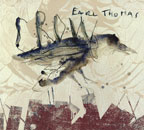 Earl
Thomas
Earl
Thomas
Crow
Conton Music and Earl Thomas Music 2016
Based in San Diego, soul and blues singer Earl Thomas Bridgeman has developed
an avid following on the West Coast and in Europe and
has been one of the most popular performers on the two Legendary Rhythm
& Blues Cruises on which he has sailed. Perhaps this new CD will garner
him the national recognition that he deserves but that has escaped him
despite several previous laudable albums.
On “Crow,” Thomas has teamed up with producer, songwriter,
and guitarist Vyasa Dodson, formerly of the apparently now defunct Portland,
OR, band The Insomniacs. Dave Fleschner on keyboards, Bill Athens on bass
and Tom Goicoechea on percussion round out the ensemble. Ace harmonicat
Jason Ricci makes a welcome appearance on three tunes.
Eschewing the rollicking uptempo opener characteristic of most albums,
the CD opens with the lilting soul ballad “Some Kind of Song,”
immediately displaying Thomas’ rangy and buttery-smooth voice. It’s
followed by Thomas’ own tune, “Do I Know You,” augmented
by Ricci’s harmonica fills. The Dodson shuffle “She’s
My Baby” allows nice interplay between Vyasa’s guitar and
Fleschner’s organ. “Shotgun Wedding” and “Happiness”
inject some funk, and “Howlin’ “ and “Love School”
show that Thomas can rock as well as croon.
The following three tracks mine soul blues territory, succeeded by the
beautiful “North Country Blues,” composed by bassist Bill
Athens. The dozen cuts conclude with “When Forever…,”
which displays Thomas’ wide emotional palette.
Thomas is in top form throughout the CD, and his vocals are highlighted
deftly by Dodson’s skilled production and unobtrusive but impressive
guitar licks. This is one of the best soul blues albums of 2016.—Steve
Daniels
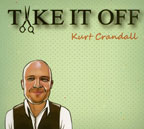 Kurt
Crandall
Kurt
Crandall
Take It Off
Yesteryear
This is an enjoyable album. Crandall is a first-rate songsmith and impressive
harper who surrounds himself with a stellar crew of players. The ingredients
are delectable. His sound is uniquely his own. On the opening 8th Event
Bill Heid sets the church tone on organ. You know it’s really a
gospel tune, but that’s the magic of the song, that wedding of gospel
and secular with tambourines, drums, and a superb backing chorus with
handclaps. Crandall sings “I saw a girl I had to meet/she was a
finely-tuned athlete” before Karl Angerer adds a rockabilly flair
on guitar. Talk about a song that has a bit of everything! The following
title cut, sung to a cha cha groove, celebrates bald heads. “Listen
to me and everything will be fine/don’t you fight mother nature/get
in line with father time/take it off/let your bald head show.” Can’t
Dance is a swinging harp blow on which Crandall decides that if she can’t
dance there’s no romance because she “ain’t got no rhythm”
and if she doesn’t have it on the dance floor, she probably won’t
have it later that night (wink wink). The band swings behind him, more
tasty guitar with Rusty Farmer on standup bass and Aaron Binder on drums.
On Loser, again floated by Heid’s sweet organ, He sings that losing
is all he does, but he hasn’t lost his love for his honey. Taquito
Under My Seat is an instrumental tango that gets feet tapping. Heid is
a master on piano here. TV Mamma is another superb acoustic harp blow
with more of that contagious Binder guitar in the mix. This is one of
Crandall’s best on the set. On Dirty Pete the groove is a 40s-style
swinger. His friend Dirty Pete is a lady’s man and he’s confused
by it. He is a “rancid man/but the ladies won’t leave you
alone.” Fun song with a metronomic Johnny Hott drum driving it.
Figgy Bag is a fiery instrumental on which our hero blows with power and
finesse. On the closing Bolivar Blues, the band shines. Aaron Binder’s
brushes, Farmer’s solid bass, Heid’s jazzy filigrees and some
of the finest harp you’ll hear all year.—Mark E. Gallo
 Matthew
Skoller
Matthew
Skoller
Blues Immigrant
Tongue ’n Groove
There are a handful of truly great harmonica players out there. Matthew
Skoller is unquestionably in that exclusive club. This is a phenomenal
album. He has a superb voice, writes intelligent songs and blows the roof
off the sucker with his 10-holed rocket. Aided and abetted by a first
rate crew of players, including Johnny Iguana on keys, Giles Corey and
Eddie Taylor, Jr. on guitars, Carlos Johnson, lead guitar on a pair of
tunes, Felton Crews on bass and Marc Wilson on drums, our hero tosses
beautiful swaths of color throughout. Opening with Big Box Store Blues,
he jumps in with both feet, singing about his most decided disdain for
the big stores. He tells his honey that he would “do anything in
the whole world for you/but I ain’t going down to no big box store.”
Great shuffle with hard blowing, note sustaining acoustic harp that just
tickles the ears.
The Devil Ain’t Got No Music is a standout tune and gets my vote
for the song of the year. Opening with Marc Wilson’s sparse jungle
drum with an equally compelling Giles Corey guitar, Skoller reminds us
that the Devil got all kindsa things but he just ain’t got no music.
He sings, “The Devil’s got the horns/Devil’s got the
tail/the Devil’s got a smile/and the key to the jail/…but
the devil ain’t got no music/that’s why his home is hell.”
He delivers it with strong vocals and explosive harp blowing. The title
cut has a metronomic acoustic guitar under his harp and vocals. He sings
a bit of recent history, from his grandfolks landing on Ellis Island,
through the murders of MLK and RFK, and wonders if he needs a green card
to bring his harp to America. That harp is especially crisp and full of
subtle fire.
Tear Collector is a beautiful blues that asks for someone to cry for him
because his lover took all his tears. Guitar, organ, and the rhythm team
are wholly impressive in their support roles. Story of Greed, opening
with brushes and an ancient harmonica wail approximates almost a slo-mo
Smokestack Lightning groove in the chorus. He sings. “It’s
a story about greed/it’s a song about death.” It’s so
heartening to hear songwriters lyrically tackle real life. The ultra-rich
and greedy have no regard for the rest of us. 747 says that she needed
to get out and a bus just wasn’t fast enough. Beautiful acoustic
harp in tandem with Johnny Iguana’s percussive piano.
On the instrumental Organ Mouth he shines with Iguana on organ. Skoller
sounds like a young little Sonny here and Iguana channels Jimmy Smith.
On the second chorus he comes back darker and quicker, but steady knockin’
out. On the closing Blue Lights there is more Little Walter influence
than elsewhere and showcases Skoller’s dynamic chops. Great album.—Mark
E. Gallo
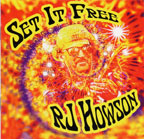 RJ
Howson
RJ
Howson
Set It Free
newsoulfood@gmail.com facebook.com/RJHowsonMusic
RJ Howson honed his chops in the Windy City before blowing down to the
Gulf Coast of Florida and playing up a storm. A regular suspect in the
Tampa area he recently moved further south to the blues hot bed of Bradenton.
The move may have inspired the muse for his new CD “Set It Free,”
it seems to be a true labor of love, RJ wrote all the songs, recorded,
engineered, mixed and mastered everything himself in his own studio. Howson
has played all the guitars, sang all vocals but is helped by his rhythm
section of Chuck Riley on bass and Pat McDonald on drums with Mark Kach
on keyboards.
The title tune, “Set It Free,” has the sound and feel of the
Allman Brothers even though it’s just a single freely flowing guitar,
Howson let’s it fly. Next from the first line of “I am”
it ain’t no backdoor or Hoochie Coochie man as Howson reaches higher
with “Lightin’Man” invoking the heavens at his command
as his fingers fly and the rhythm pounds. Adopting an Albert King-like
style on “Mojo Mama” and “Lookin’ For A Lover”
RJ croons and his guitar rips though the restrained rhythms. “Prove
This Love Is True” is a guitar thrill ride sweeping to string bending
heights then plunging off that edge, notes flying off on the ride down.
Picking up the pieces “Sweet Soul Sister” has the organ and
vocals carrying the tune till a “Layla”-like solo raises at
the finale. A burning boogie lights up “Carry Me Mama,” the
vocals sing that he’s “hung out on the wire” but the
guitar and piano are on fire. “I Got Mud” gets down with some
dirty chicken scratching rhythm under sweeping power chords then takes
it deeper as Howson cries “can’t keep a good soul down”
and the guitar is set free to “Make A Joyful Sound” with Allman
influences returning on a Dickey Betts like solo and ringing out throughout
the melody. For a real change of pace Howson closes with a wish of good
tidings and using a hushed reverberating tone gently sings “Until
We Meet Again.”
RJ Howson is a musician who truly loves the life he leads and he’s
put it all on the line in order to “Set It Free.”—Roger
& Margaret White
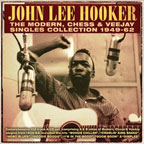 John
Lee Hooker
John
Lee Hooker
Acrobat 4-CD 7103
www.acrobatmusic.net
The legendary Boogie Man, John Lee Hooker, was one of the foremost guiding
spirits of the mid-60s blues boom. Early on known commercially as Birmingham
Sam & His Magic Guitar, Texas Slim or Little Pork Chops among other
aliases, Hooker was born toward the tail-end of August in 1912 to a sharecropping
family, led by a Baptist preacher, in the tiny town of Tutwiler, Mississippi
in Tallahatchie County, and was influenced early on by both his stepfather—droning,
one-chord blues stylist Willie Brown—as well as his running pal
Tony Hollins, who was dating Hooker’s sister, Alice, at the time.
The youthful musician moved to Memphis in his teens and began playing
with the likes of Robert Nighthawk but around 1943 he relocated to Detroit,
where he worked at the Ford plant during the day and played the clubs
on and near fabled Hastings Street, the dynamic center of the black community’s
night life on the east side, on the weekends. He also began his recording
career in the Motor City in 1948 where his initial session produced the
biggest selling “race record” of 1949, “Boogie Chillun,”
that featured his signature gravel-voiced singing alongside his hypnotic,
foot-stompingly boogiefied guitar rhythms. This 4 CD, 101 track project
chronologically spotlights both the A and B sides of all the singles recorded
under his own name for the Modern, Chess and Vee Jay labels from 1949
through to 1962, thus proffering a comprehensive overview of his output
during this key period of his career as well as an excellent showcase
for his one-of-a-kind talent. Naturally, all the hits are here—from
the fore-mentioned million seller “Boogie Chillun” and “Crawlin’
King Snake” to “Hoogie Boogie” and “Hobo Blues.”
From “Boom Boom” and “I’m In The Mood” to
“Tupelo” and “John Lee’s House Rent Boogie.”
An enclosed booklet features comprehensive liners by Paul Watts along
with full discographical and session details. Well worth hunting down!—Gary
von Tersch
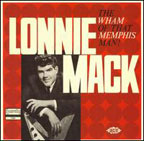 Lonnie
Mack
Lonnie
Mack
The Wham Of That Memphis Man
Ace CDCHM-1134
As liners authors Dave Burke and Alan Taylor, of Pipeline magazine, put
it at the outset of their informative, photo-studded liners: “Credited
as one of the principal instigators of blue-eyed soul as well as the inspiration
for southern rock, roadhouse bar-blues and the legion of blues-based guitar-slingers
that plied their trade throughout the 60s, 70s and beyond, Lonnie Mack
may not be a household name but he was one of the genuine giants of music.”
Born into a musical family in the backwoods of Harrison, Indiana in 1941,
Mack left high school at 13 and spent the next two decades recording for
a string of local, independent labels while maintaining an exhausting
schedule of one-night stands, playing his Flying V guitar for all it was
worth in raucous taverns, honky-tonks and blues clubs before his arresting
instrumental take on Chuck Berry’s “Memphis” became
an out-of-the-blue Top Ten smash in the summer of 1963. It was closely
followed by another pull-out-all-the-stops number, penned by Mack and
titled “Wham!” As Burke and Taylor note: “Because of
Lonnie’s plentiful use of the Bigsby tremelo arm on “Wham!”
the device became known as a “whammy bar.” Originally released
on Cincinnati’s Fraternity label in October, 1963, Mack’s
classic, eleven track debut album remains one for the ages—every
cut here is terrific—Mack’s “lightning fast guitar runs,
punctuated with amazing string-bends, an organ-like tone and piercing
guitar notes, put most other instrumentalists to shame.” Equally
accomplished are Mack’s hypnotic, blue-eyed soul vocals (often in
front of the stupendous Charmaines vocal group) with gospel hollers and
heartbroken screams multiplying the music’s thrusting power and
rapturous aura. Personal favorites include two inspired sacred covers
(The Five Blind Boys of Mississippi’s classic “Where There’s
A Will” and Martha Carson’s rousing “Satisfied”)
along with all the groundbreaking instrumentals. Lonnie died last April,
with this release already in the works. Now it stands as a fine memorial
to an early guitar hero. Back in the day (I graduated from high school
in 1963) this was one of those scant “all killer, no filler”
LPs. Long live Lonnie Mack!—Gary von Tersch
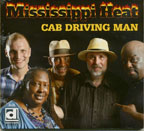
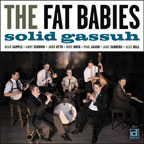 Misssissippi Heat
Misssissippi Heat
Cab Driving Man
Delmark CD 848
The Fat Babies
Solid Gassuh
Delmark CD 257
The heat on the stove is cranked all the way to “Hi” once
more for the twelfth chapter in the quarter-century history of licensed
clinical psychiatrist Pierre Lacocque’s tight Mississippi Heat band.
His ardently eloquent harmonica work and savvy songwriting skills (often
composed from a woman’s perspective and frequently commenting on
contemporary issues) are ably aided and abetted by a roster of heavy hitters—most
notably earnest vocalist Inetta Visor, eloquent guitarist, vocalist and
songwriter Michael Dotson, bassist Brian Quinn and groove-deep drummers
Terrence Williams and Kenny Smith and keyboardist Chris “Hambone”
Cameron. Saxophone maven Sax Gordon also “special guests”
on five tracks with his soulful insinuations particularly effective on
both the title song—an atmospheric nod to Cab Calloway’s stony,
cabaret-blues approach— as well as on an inspired cover of Sarah
Vaughan’s memorable toast to her “Smooth Operator.”
Lacocque’s exemplary originals run the gamut from low-down Delta
and Chicago blues and boogie woogie to party-down-den numbers, R&B
ballads and cajun reveries with subject matter that “runs the gamut
of the human experience from the purpose of life to the glory of love,”
as liners author Greg Easterling accurately puts it. Further ravers begin
with the opening “Cupid Bound,” “Flowers On My Tombstone,”
“Life Is Too Short,” “Mama Kaila” and the closing
shout-out “Hey Pipo.” An entertaining and rootsy musical smorgasbord
of the highest order! Play loud! Which brings us to another
recent Delmark release, featuring the Windy City’s most popular
vintage hot jazz band—the Beau Sample-led Hot Babies. Sample plays
string bass, with Andy Schumm on cornet, John Otto on either clarinet
or alto sax and Paul Asoro on piano and the occasional vocal—he
particularly shines on a deliriously exciting “Egyptian Ella,”
Benny Goodman’s “After A While” and the visionary “Did
You Ever See A Dream Walking?” Tenor banjoist and guitarist Jake
Sanders and drummer Alex Hall round out the hot-to-trot septet. Currently
in residency at the world famous Green Mill in Uptown on every Tuesday
and on every Sunday at the Honky Tonk BBQ in Pilsen (where this after-hours
recording was done) the fresh-faced combo is musically soaked in the idiom’s
early days as they pay a vibrantly fresh tribute to a host of the era’s,
often unsung, trailblazers—from Wingy Manone and Bud Freeman to
Johnny Dodds and Albert Wynn. From Muggsy Spanier and Punch Miller to
Lillian Armstrong and Clarence Williams—that never fails to have
the dance floor full in no time flat. Other recommends include a modernistic
“Delirium,” a flag-waving rendition of Luis Russell and Paul
Barbarin’s “Doctor Blues” and a fiery cover of Thomas
Dorsey’s dazzling “Parkway Stomp.” A “solid gassuh”
through and through, as Louie would put it.—Gary von Tersch
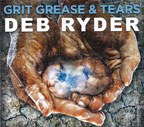 Deb
Ryder
Deb
Ryder
Grit Grease & Tears
Bejeb Music 2016
This third album by chanteuse Deb Ryder is a winner. It doesn’t
hurt that she has enlisted the talent of drummer and ace producer Tony
Braunagel, whose efforts are enforced by Johnny Lee Schell on guitar and
Mike Finnigan on keyboards. (Recognize those names? That’s the core
of the Phantom Blues Band, Taj Mahal’s ace ensemble for the last
couple of decades.) A slew of other top-flight musicians make appearances,
but the focus is appropriately on Ryder’s vocals.
This lady has the pipes! She proves it from track one, “Ain’t
Gonna Be Easy,” a rocker that incorporates a growl into her powerful
vocal. It’s followed by one of the highlights of the set, “Get
a Little Steam Up,” wherein she duets with rising star Sugaray Rayford.
The funky tune presents two of the most forceful singers on the contemporary
blues scene, and they mesh expertly.
“Blink of an Eye” is a shuffle giving room for Schell to vamp
on slide guitar, with assistance from Pieter van der Pluijm (“Big
Pete”) on harmonica…who then hands the harmonica duty to Bob
Corritore on the slow and spooky title cut, enhanced also by West Coast
guitarist extraordinaire Kirk Fletcher (most recently part of Joe Bonamassa’s
touring band).
By now you get the picture: each cut is an all-star outing with a rotating
cast of characters, anchored by Ryder’s vocals. Making appearances
are Joe Sublett and Darrell Leonard of the Phantom horn section, bassist
Kenny Gradney of Little Feat, and former Robert Cray keyboard man Jim
Pugh. Present on only one track but shining is legendary guitarist Albert
Lee on the country-flavored “Just Her Nature.”
Perhaps as impressive is Ryder’s songwriting: she composed all dozen
tunes, all based in blues but touching on country, rock, and even gospel.
Oh, yes, and boogie, too: check out “Prisoner of War,” with
the basic group running on all cylinders, Big Pete wailing on harmonica.
Good stuff!—Steve Daniels
 Sari
Schorr
Sari
Schorr
A Force of Nature
Brand New Music
When famed producer Mike Vernon produces your debut disc it’s a
big deal. Sari Schorr didn’t chase him down. Vernon pursued her
based on how impressed he was at first hearing her. She has that effect.
Hers is a major voice waiting to be discovered by the rest of the world.
She has the ability to be explosive and to be demure. Add to that her
exceptional lyrical skills and you have a Force of Nature comin’
at ya.
Ain’t Got No Money opens with a searing Innes Sibun guitar, signaling
the locomotive vocal that follows. The slice of life lyrics are the Universal
theme we’ve all seen at times: “Ain’t got no money/Got
no work no play/Well I ain’t got no money/But I still got bills
to pay.” Her elastic powerhouse vocal cords come to life here. The
interplay between singer and guitarist is seamless and dynamic. Singers
often stretch their capacity and sound like screamers. Schorr hits the
extremes successfully. When she unleashes her pipes the result is crystal
clear diction and power that never sounds strained.
Aunt Hazel, an ode to the power of heroin (“I’m in trouble
again/just one hit to clear my mind/I’ll pay the rent another time”)
is starkly gutsy. Sibun’s guitar is again a force of its own. Damn
the Reason, a song that weighs the pros and cons of leaving with Ollie
Brown now on guitar, is a medium tempo over which her vocals ring “don’t
want to see myself in your eyes.” Cat and Mouse is about self-fulfillment
and when she sings that she will “pack up my secrets and leave the
rest to you” you know this is a woman on a mission. On his Work
No More guitarist extraordinaire Walter Trout propels Sari to gorgeous
bluesy lines about reaching the goal. On Demolition Man she sings, “You’ll
never quit your sinning ways/you’re just the man I need.”
The lyrics on Oklahoma are transcendent: “There’s a big fat
moon in a jealous sky/Mocking the way that my lover done bid me goodbye.”
Letting Go is a song about coming to grips with a new normal. She sings,
“All my dreams belong to yesterday” and vows, “I will
love you forever/’Til the stars retreat from the sky.” This
is a standout. Her vocalizing is bluesy and mesmerizing. The backing is
first rate, as well, with Sibun on guitar, Quique Bonal on rhythm guitar,
Jesus Lavillas on keys and the solid rhythm section of bassist Nani Conde
and drummer Jose Mena.
Kiss Me (“There’s a hummingbird’s wings/beating in my
chest ….all I want you to do is kiss me”) is a song most of
us can relate to and Ordinary Life (“I’ve made my piece with
loneliness”) close an album that is wholly impressive, top to bottom.
In a field of first-rate female vocalists that we’ve been blessed
with this year, Sari Schorr more than holds her own. — Mark Gallo
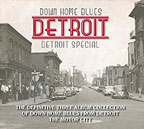 Down
Home Blues
Down
Home Blues
Detroit Special
Wienerworld 3CD—5095
As it asserts on the car-cluttered street on the bottom of this vintage
1960 Hastings Street cover-photo, this 3 CD, 82 title (lotsa rare &
unissued) project is “The definitive three album collection of down
home blues from Detroit.” The 21 artists featured (John Lee Hooker,
Baby Boy Warren, Eddie Burns, Doctor Ross, Eddie Kirkland, Bobo Jenkins
and Earl Chatman among them) provide a comprehensive view of the post-war
blues scene in the Motor City from 1948 through 1962. The three discs
come in a sturdy, deluxe digipak with an outer slip-case that includes
a fifty page booklet with extensive liners dealing with the decidedly
raw music and the surroundings that generated it by renowned veteran researcher
and historiographer Mike Rowe, who proffers incisive biographies of the
musicians (others include Slim Pickens, L.C. Green, Martee Bradley, John
Brim, Detroit Slim and Little Sonny) and complete session details along
with a slew of colorful label shots, track listings and vintage photos
of the clubs, bars and restaurants where they performed in Detroit’s
downtown black neighborhood known, tongue-in-cheekly, as Paradise Valley.
Quite fittingly, the bulk of the titles are by guitarist and singer/songwriter
Baby Boy Warren, who in the 1930’s had played in Memphis’
fabled W.C. Handy Park along with Robert Lockwood Jr., Howling Wolf and
Sonny Boy Williamson, with nary a clunker in the bunch. The silver medal
is shared by Eddie Burns and Bobo Jenkins with ten songs each (Warren
has 16) with John Lee Hooker and Little Sonny at seven each—four
of Hooker’s are stupendous solo efforts, originally issued on Chicago’s
Chance label, and all the evidence necessary to understand where his sobriquet
“The Boogie Man” came from. But, thrillingly, even one-shot
wonders like Little Daddy Walton (with his tenacious harp blues “Papa
Doo”), Detroit Count (with his rip-roaring “Detroit Boogie”)
and Carolinian Henry Smith recalling Blind Boy Fuller with his “Dog
Me Blues” also impress. One of the most entertaining 224 minutes
I’ve had in a long time. And for those who desire to dig deeper,
the UK’s Ace label also has an equally splendid, multi-disc Detroit
Blues package available entitled “Battle of Hastings Street”
and, just last year, JSP released a similar compilation titled “Garden
City Blues.” All essential five-star listening for any blues aficionado.—Gary
von Tersch
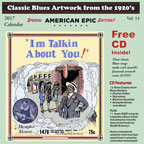 Classic
Blues Artwork From The 1920s
Classic
Blues Artwork From The 1920s
2017 Calendar With Cd
Blues Images www.bluesimages.com
Since 2004, Grants Pass, Oregon’s Blues Images operation has been
doggedly dedicated to bringing blues fans worldwide outsize reproduction
of classic blues artwork, rare photographs and recorded music with an
annual calendar/CD set. Rising production costs have forced a slight price
increase this year but the quality of the breathtaking sound reproduction
on the enclosed 23 track CD is nothing short of amazing as, for the second
year in a row, Images head honcho, John Tefteller, has joined up with
PBS and the BBC’s American Epic documentary organization and their
highly developed ultra-modern digital restoration technology. Of course,
it also helps that the very finest copies of the original blues 78’s
available are played on the original 1920s studio playback equipment to
begin with—all in all, the result is a lot less surface noise and
heightened dynamic range. You can hear Charley Patton’s chair creak
during the testifying gospel track “Lord I’m Discouraged”
(cut during his initial Paramount session in 1929) while a cricket audibly
joins the Mobile Strugglers on “Fattenin’ Frogs” from
1949 (later “covered” by Sonny Boy Williamson) and, if you
listen closely, you can hear Mr. Memphis Minnie—Kansas Joe McCoy—clearing
his throat before beginning this year’s Halloween offering “Mr.
Devil Blues.” Other calendar-linked gems include the two-part magnum
opus “Cottonfield Blues” (with Garfield Aker’s eerily
unforgettable vocal), a vivid barrelhouse piano stomper titled “Louisiana
Glide” by one Blind Leroy Garnett and the reflective “Let
Your Light Shine On Me” by the legendary Blind Willie Johnson. Also
featured are a pair of numbers by both the prolific Big Bill Broonzy (the
downbeat “Can’t Be Satisfied” and “The Western
Blues”) and Blind Joe Reynolds—an oddly-titled “Nehi
Mama” (that’s got nothing to do with soda pop) and the declamatory
“Outside Woman Blues”—along with one of cover girl Memphis
Minnie’s biggest hits, “Bumble Bee,” and a closing couple
by inventive bottleneck guitarist Ishman Bracey from 1930—the high-wire
“Woman Woman Blues” and the imagistic “Suitcase Full
Of Blues.” A unique combination that is the perfect Christmas gift
for blues aficianados everywhere!—Gary von Tersch
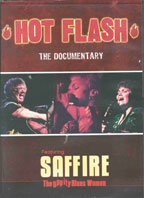 Hot
Flash – The Documentary
Hot
Flash – The Documentary
Saffire - The Uppity Blues Women
A JO Films and Roadside
Pictures Production www.ChoicesVideo.net
Bands not tied together by blood often consider themselves family. Some
bands’ fans are as much a part of the family as the musicians themselves.
Saffire - The Uppity Blues Women fall into both categories as I was reminded
of that fact after meeting up with Gaye Adegbalola this past summer. I
don’t recall how it came up in conversation but she was surprised
to learn I was not aware of this Saffire 2008 DVD release. Shortly thereafter
I find the DVD in my mailbox. Perfect timing? Yeah, ’cause we’re
doing a family issue and maybe what the world needs right now is a good
ol’ family reunion.
Hot Flash gives a great view into the history of Saffire – with
Gaye practically becoming an Ann Rabson groupie before ultimately adding
Earlene Lewis to the mix and thus Saffire is born. Andra Faye is brought
in 5 years later when Earlene departs and the rest is history. Their tale
is spun from interviews with the members as well as music industry luminaries,
some live performance snippets and old footage, pictures and press clippings.
It will put a smile on your face, perhaps teach you some things about
the band you didn’t already know (I certainly found out some fun
facts) and will have you longing for those days gone by when you could
check your local club or festival calendar and look forward to a Saffire
performance, maybe a Saffire ‘experience’ would be more fitting,
in those coming days, weeks or months.
If you already own this wonderful piece of history, now would seem a good
time to take another look. If this escaped you, as it did me – now
would be a great time to add it to your collection.
I write this the day after Thanksgiving – a day when we’re
all too painfully reminded of those whose empty spot at the table can
never be filled. Such it is with Saffire, a reunion that can never occur
with the passing of Ms. Rabson in 2013 – but for those who still
mourn the band’s ending, well, as Johnny Thunders once said, ‘You
Can’t Put Your Arms Around a Memory,’ but you sure can wrap
your head and heart around this video and escape from reality for a short
time. —Guy Powell
Home
/ Blues Blogs /
Artist Links / Blues
Links / Videos / Store
Subscribe / Advertise
/ Back Issues
/ Contact / Staff